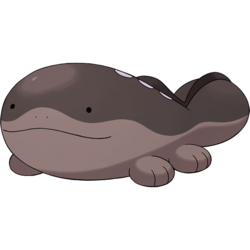From Bulbapedia, the community-driven Pokémon encyclopedia.
Clodsire (Japanese: ドオー Dooh) is a dual-type Poison/Ground Pokémon introduced in Generation IX.
It evolves from Paldean Wooper starting at level 20.
Biology
Clodsire is a quadrupedal, amphibious Pokémon, with a rounded body that is dark brown on the top and light brown on the bottom, forming a wave pattern in the middle. It has black beady eyes, a large mouth, and a pair of tiny nostrils. Its four legs are rounded and have three digits each. A short dorsal fin delineates its lower back and ends at its stout, bulbous tail.
On top of Clodsire's back are six light purple circular spots. If Clodsire is attacked, it will retaliate by sticking out large, thick, light purple spines from these spots — a dangerous and risky move. Clodsire lives in the depths of ponds and swamps, and helps Paldean Wooper cross waters by carrying them on its back.
In the anime
Major appearances
Minor appearances
In the manga
Game data
Pokédex entries
| This Pokémon was unavailable prior to Generation IX.
|
| Generation IX
|
|
|
Paldea
#54
|
| Scarlet
|
When attacked, this Pokémon will retaliate by sticking thick spines out from its body. It’s a risky move that puts everything on the line.
|
| Violet
|
It lives at the bottom of ponds and swamps. It will carry Wooper on its back and ferry them across water from one shore to the other.
|
|
|
Game locations
| This Pokémon was unavailable prior to Generation IX.
|
|
|
In side games
Held items
Stats
Base stats
| Stat
|
Range
|
| At Lv. 50
|
At Lv. 100
|
130
|
|
190 - 237
|
370 - 464
|
75
|
|
72 - 139
|
139 - 273
|
60
|
|
58 - 123
|
112 - 240
|
45
|
|
45 - 106
|
85 - 207
|
100
|
|
94 - 167
|
184 - 328
|
20
|
|
22 - 79
|
40 - 152
|
Total: 430
|
Other Pokémon with this total
|
- Minimum stats are calculated with 0 EVs, IVs of 0, and (if applicable) a hindering nature.
- Maximum stats are calculated with 252 EVs, IVs of 31, and (if applicable) a helpful nature.
|
Type effectiveness
| Under normal battle conditions in Generation IX, this Pokémon is:
|
|
|
|
|
|
|
|
|
|
|
|
|
Learnset
|
|
|
|
- Bold indicates a move that gets STAB when used by Clodsire
- Italic indicates a move that gets STAB only when used by an Evolution of Clodsire
|
|
|
|
|
- Bold indicates a move that gets STAB when used by Clodsire
- Italic indicates a move that gets STAB only when used by an Evolution or an alternate form of Clodsire
|
|
|
|
|
- Moves marked with an asterisk (*) must be chain bred onto Clodsire
- Bold indicates a move that gets STAB when used by Clodsire
- Italic indicates a move that gets STAB only when used by an Evolution of Clodsire
|
|
|
|
|
- Bold indicates a move that gets STAB when used by Clodsire
- Italic indicates a move that gets STAB only when used by an Evolution of Clodsire
|
Side game data
Evolution
Sprites
Trivia
Origin
Clodsire, its Poison typing, and its ability to extend spines out of its body all appear to be based on the Iberian ribbed newt, which is known for its ability to puncture its sharp ribs through its skin and coat them in poison as a defense mechanism. Clodsire also somewhat resembles a giant salamander and a smooth-head blobfish.
Name origin
Clodsire may be a combination of clod (lump of earth), sire or Siren (a genus of salamander), and Quagsire.
Dooh may be a combination of 土 do (earth or ground), 毒 doku (poison), 王 ō (king), オオサンショウウオ ōsanshōuo (Japanese giant salamander), and ヌオー Nuoh (Quagsire).
In other languages
| Language
|
Title
|
Meaning
|
 Japanese Japanese
|
ドオー Dooh
|
From 土 do, 毒 doku, 王 ō, 大山椒魚 ōsanshōuo, and ヌオー Nuoh
|
 French French
|
Terraiste
|
From terre, majesté, and Maraiste
|
 Spanish Spanish
|
Clodsire
|
Same as English name
|
 German German
|
Suelord
|
From Sumpf, Lord, and Morlord
|
 Italian Italian
|
Clodsire
|
Same as English name
|
 Korean Korean
|
토오 To'o
|
Transcription of Japanese name
|
 Mandarin Chinese Mandarin Chinese
|
土王 Tǔwáng
|
From 土 tǔ, 王 wáng, and 沼王 Zhǎowáng
|
 Cantonese Chinese Cantonese Chinese
|
土王 Tóuwòhng
|
From 土 tóu, 王 wòhng, and 沼王 Jíuwòhng
|
|
|
|
| More languages
|
 Thai Thai
|
โดะโอ Do-o
|
Transcription of Japanese name
|
|
|
|
Related articles
External links

|
This Pokémon article is part of Project Pokédex, a Bulbapedia project that aims to write comprehensive articles on each Pokémon species, as well as Pokémon groups and forms.
|




